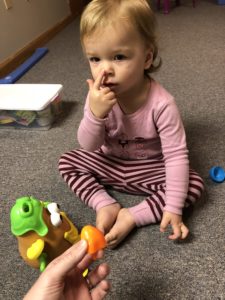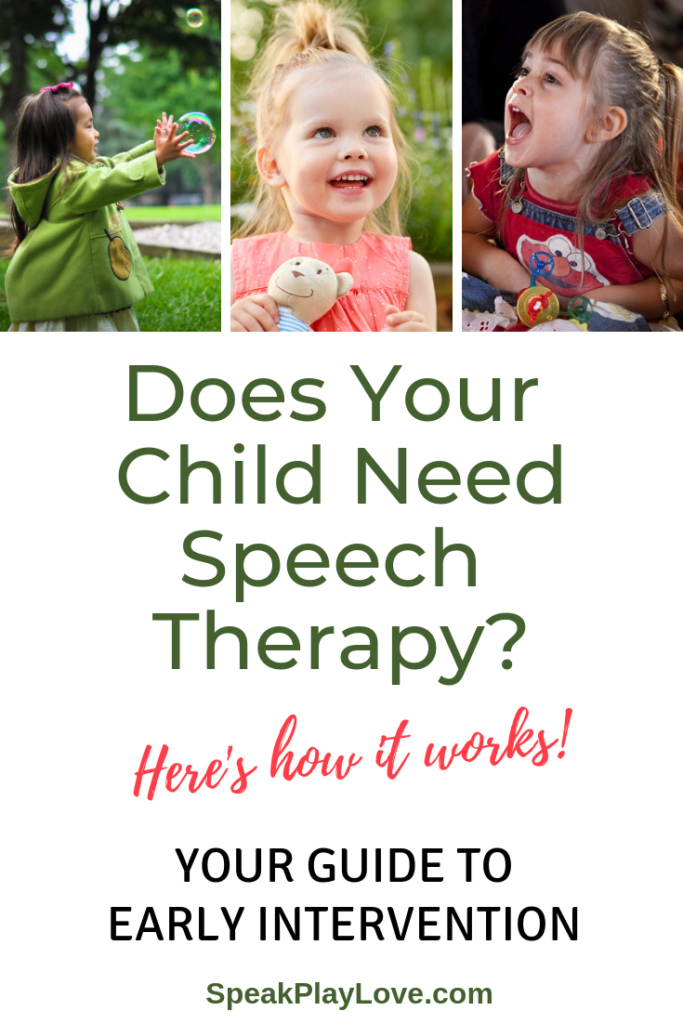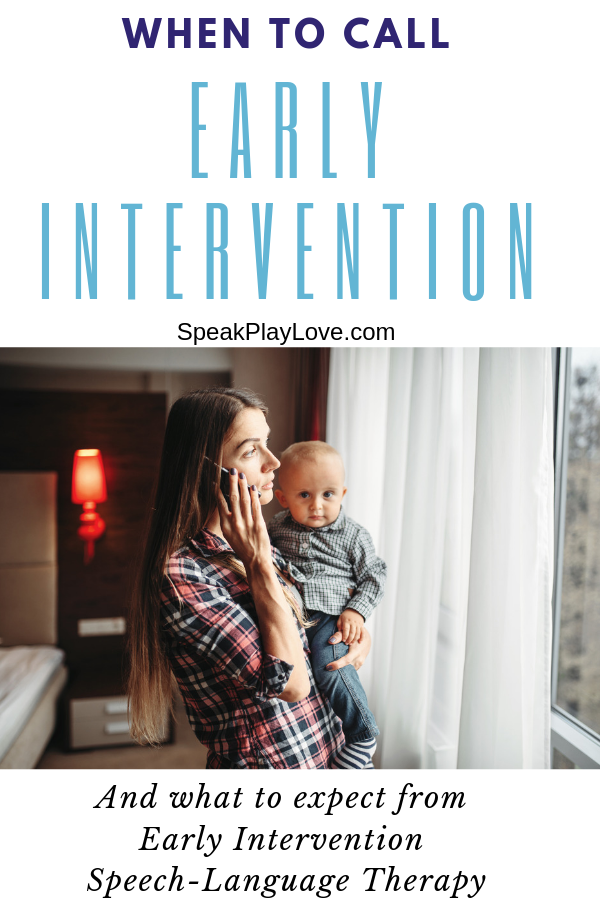
Should You Call Early Intervention for Speech Therapy?
Not sure if your toddler needs Early Intervention speech therapy? Or you think he does have a speech delay, but are not sure exactly how to get therapy started. And what are the steps involved? Don’t worry – here’s an overview of what to expect!
Early Intervention programs are public agencies that provide services for children from birth-three years of age. One caveat – early intervention services are handled a bit differently by each state. I live in New York state, so that is where my first-hand knowledge comes from, but I will try to give broader information that should be applicable to all states.
Unfortunately, some states have a reputation for providing better services than others. Here in New York, families that need services are not charged directly. On the other hand, there can often be long wait lists to get evaluated and to get services started.

Benefits of Early Intervention Speech Therapy
The benefits of early intervention are HUGE. If you walk away with anything from reading this article, I hope it is that you should not sit and “wait it out” if you think your child might have a language delay.
- Children’s rate of learning is at it’s peak in the preschool years, so falling too far behind at that age can make it difficult to catch up later in the school-aged years. Instead, “early intervention” takes advantage of this period of peak learning to provide targeted therapy with the intention of catching a child up to their peers.
- A child’s behaviors are often linked to frustration about not being able to communicate his wants and needs or from not understanding what is happening around him. Early intervention speech therapy can 1) encourage verbal communication, 2) teach communication alternatives to use right away, and 3) increase understanding of language though use of visuals in the home.
- The early intervention model includes family support and parent training.
RELATED: Do’s and Don’ts for Getting Your Toddler to Talk
RELATED: Practice Vocabulary with these Printable Sorting Mats in my Etsy Shop!
This post contains affiliate links, which means we could receive a commission if you click a link and purchase something that we have recommended.
When Should I call Early Intervention for Speech Therapy?
I would advise that you look at the warning signs by age on in this article from the American Speech-Language-Hearing Association (ASHA) as a guide and then come back here!
Okay, now that you looked at the chart, if you think that your child has warning signs, go ahead and contact one of the organizations listed in the section below.
If you still have questions after looking at the chart, feel free to drop a question in the comments section below. (If you have a question, then someone else probably has the same question!)
Who do I contact?
- You can talk to your child’s pediatrician to get a referral for Early Intervention speech therapy. But a pediatrician is not the only option. (Occasionally a pediatrician will have a “wait and see” viewpoint when you know in your gut that something is wrong.)
- Another option is to contact your local Parent Training and Information Center. These centers have staff members that can talk to you about how the Early Intervention program works in your area and help you get started.
- You can also contact your local Early Intervention program directly. Parents can make their own referrals! Click here for a directory of programs by state.
RELATED: Using a Visual Schedule to Reduce Tantrums (Free Printable)
First: Referral and Screening
Technically the first step is getting a referral, which can come from your child’s pediatrician, but it can also come right from you!
If your child does not have a diagnosed disability, then a screening is often done to see if a full evaluation should be completed. That’s why there really is nothing to lose in contacting your local Early Intervention center – they can help you decide if an evaluation makes sense after talking to you and doing a quick screening.
Note: If you speak to someone and decide that you’d rather not have a full evaluation done, it is your decision. You must sign paperwork giving permission for professionals to evaluate your child.

Second: Evaluation
At this point, you and your child will be assigned an Initial Service Coordinator as a point of contact for the Early Intervention program. This person will help you though the evaluation process by scheduling the evaluation and answering any questions you have along the way.
Based on the screening, a team will evaluate your child. If your child is being seen for speech-language concerns, this team will usually include a special education teacher, a Speech-Language Pathologist (SLP) and your service coordinator.
Don’t be alarmed by the formal tone of an “evaluation.” At this age, an evaluation will be play-based. Even though the professionals will be looking at many factors and skills, your child will most likely just think he is playing with new toys and fun new people! And you can help out by answering questions about what your child does at home.
Often you will be given a questionnaire to fill out or asked questions about your child’s skills. If you are like me and tend to go blank when people ask you a lot of questions, then you can bring some notes with you.
What should go in your notes? If your child has a few words, make a list of those words. If he doesn’t talk yet, think about how he communicates – any gestures, pointing, pulling your arm, eye-contact, crying, etc. Also, write down any questions you have.
Usually the evaluation takes place right at your own home or your child’s daycare. It is best to do an evaluation in the most natural environment possible, but occasionally they are done in a clinic or office.
RELATED: Grab these Song Choice Cards from my Etsy shop!

Third: Meeting to Go Over the Plan
Next you will have an IFSP meeting. That stands for Individualized Family Service Plan, which is a document that is specially designed for your child and family that outlines the early intervention services and goals your child will receive over the next six months.
The professionals will make their recommendations based on what they found out from their evaluations. This is a great time to ask questions if anything is unclear. The document is meant to be a collaborative effort of the family, evaluators, and service coordinator.
RELATED: 9 Tips to Get Your Toddler Talking
Fourth: Start Therapy Services
Therapy is provided in a natural environment, just like the evaluation, such as your home or at your child’s daycare/preschool.
Some therapists bring a big bag of toys and materials to target specific skills; other therapists use a “bagless” approach, meaning that they use the toys and activities in the natural environment to encourage good carry-over of the skills when the therapist is not there.
Though it may look like the the therapist “just playing” with your child, she has specific goals and skills she is targeting. If you are not sure what that skill is, just ask! Most therapists are thrilled to share what they are doing and why.
A bit part of the early intervention model of therapy is parent training and education. Remember that your child is only receiving therapy a few times per month, but you are with your child every day! If the therapy is taking place at a daycare, try to connect with the therapist via phone or even schedule to come in an observe some sessions.
RELATED: Best Toys for Encouraging Language Development
Fifth: Discuss Progress
The IFSP document discussed in step three lasts for six months, so every six months the team will meet to discuss progress and decide whether services should continue.
If services should continue, then they will write new goals (what the professional hopes your child will accomplish in that next six month span) and make any adjustments needed to the document.
Every twelve months a re-evaluation is completed to see if your child continues to qualify for services and how much progress he/she is making compared to the last evaluation. If you like data as much as I do, you’ll find this part interesting! Don’t be afraid to ask questions about how to break down the scores and comparisons.
RELATED: Laying the Foundation for Talking through Imitation
RELATED: Practice Object Function Questions with these Printable Cards in my Etsy Shop!
Pin It for Later!





10 Comments
hannah william
Nice article. I love reading evaluation stage. Thanks for sharing valuable post.
Sam Gibson
Thanks for sharing this information about speech therapy. My sister is concerned about her oldest son. She’s hoping to find a good therapist who can work with him and help him.
rachel frampton
My child is experiencing difficulty in speaking. I never knew that a child’s behavior is often linked to not being able to express his feelings through words. No wonder my son behaves this way; I better start looking for a pediatric therapy clinic that can help us out.
Rashedul Momine
Thanks for sharing this information about speech therapy. It’s really awesome work. Lot’s of people can benefited by this article. I would love to share you a baby toys site. Please check it reply me your feedback. I’m really love to work for kids. I’m really love kids. thank you very much. https://kiddiesproduct.com/good-baby-toys/
Vivek
Nice article. I love reading evaluation stage. Thanks for sharing this information about speech therapy.
Dwanlin Rosh
These are some great resources, thanks! Because our Patient has a disability and is eligible for Medical Assistance in our state, that speech therapy will also cover some therapy our regular intervention service won’t.
Megan Alder
It’s interesting to know how child behavior is linked to their frustration of not being able to communicate their wants or needs. My husband and I think that our daughter has problems with communication and that we should take her with a specialist to improve her situation. I will start looking for a specialist that can work with her to improve that complicated side of her communication.
Zoe Campos
Thanks for warning me that not intervening early enough might cause my daughter to fall behind her expected rate of learning. She doesn’t talk that much and I initially thought she was just shy, but I guess that isn’t always the case. It might be better to have her checked by an expert and see if she’ll be in need of speech therapy.
Anson
Hey! You have shared very useful content. We are also follow the few process which you mentioned in the post. This article will helpful to know more about the early intervention for speech therapy.
Yolanda M
These are so wonderful and I’m so excited to try them out with my son! I’m so eager to help him learn, I can see the frustration in his little face when he can’t communicate and the intrigue when I teach him new things. I have a feeling these activities will help ❤️